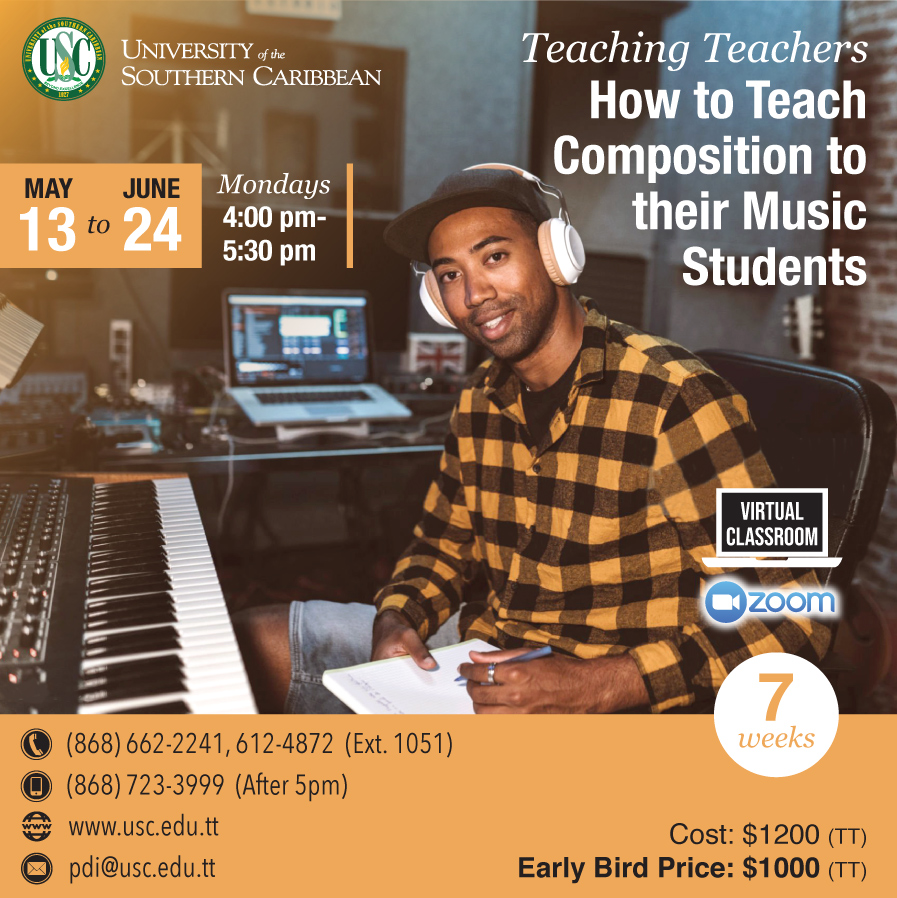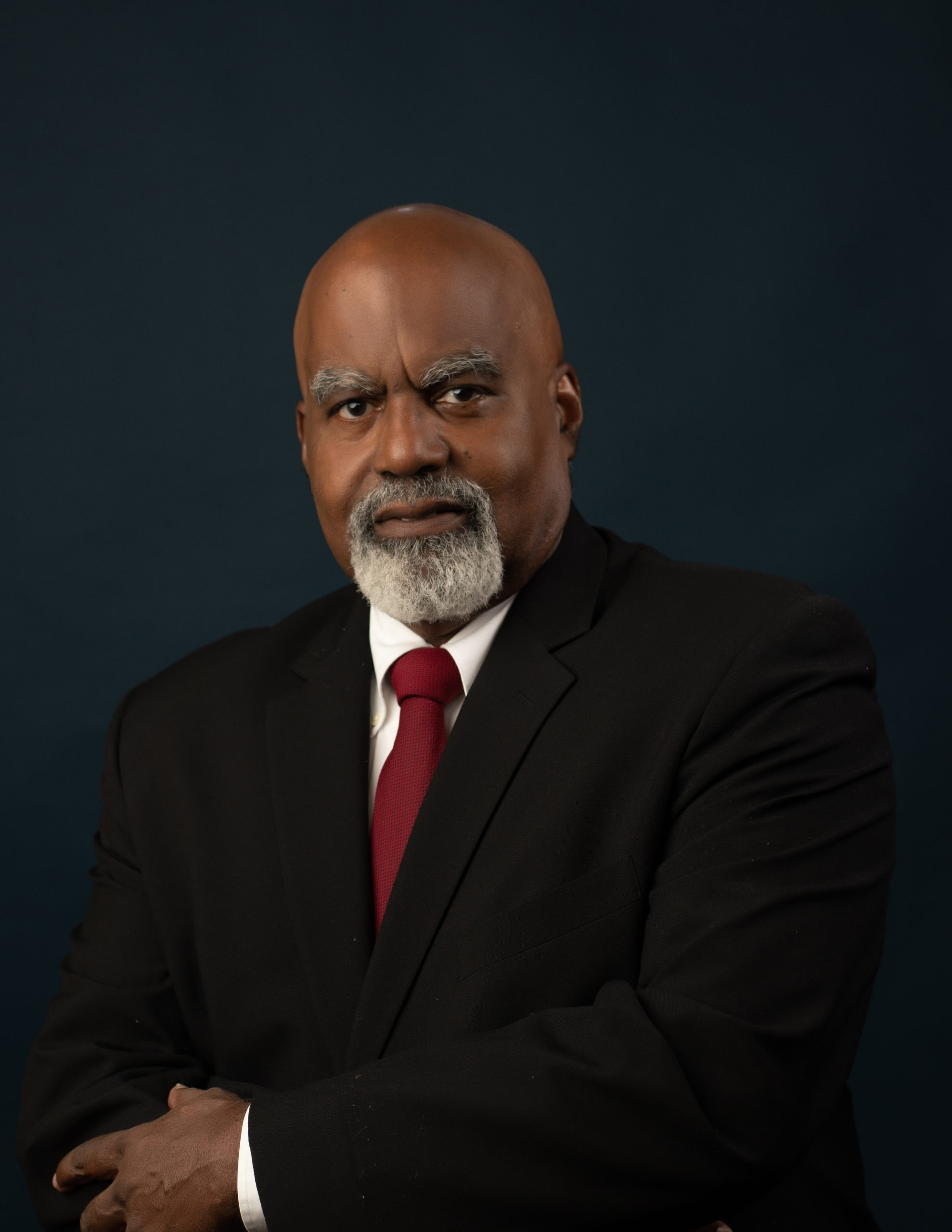Teaching Teachers How to Teach Composition to Their Music Students
Course Details
DATE: May 13th to June 24th on Mondays
TIME: 4:00pm - 5:30pm
DURATION: 7 weeks
CLASS MODE OF DELIVERY: Online Classroom (Zoom)
EARLY BIRD PRICE: $1,000 TT
PROGRAM COST: $1,200 TT

- Program Schedule
- Aims
- Participants
- Programme Description
- Expected Learning Outcome
- Programme Structure
- Learn About the Lecturer
- Completion Requirements
Programme Schedule
The programme will run from May 13th to June 24th, meeting Mondays 4:00 to 5:30 pm in a virtual classroom.
Aims
This course aims to provide participants to empower teachers with the knowledge, skills, and resources needed to effectively teach composition to their music students, fostering creativity, musical expression, and lifelong engagement with music.
Participants
Teachers across various music disciplines, including composition, theory, and general music, spanning all educational levels from elementary to college, can refine their pedagogical techniques and broaden their instructional toolkit for teaching composition to their students. Both instrumental and vocal music instructors aiming to integrate composition activities into their teaching can acquire practical strategies and resources to seamlessly incorporate composition instruction into their current curriculum. Specialized composition educators can delve deeper into effective teaching methods, assessment strategies, and curriculum design principles tailored specifically to composition education. Additionally, undergraduate and graduate students pursuing degrees in music education, composition, or related fields can complement their formal academic studies with practical skills and insights relevant to teaching composition to future students. Furthermore, school administrators such as principals and curriculum coordinators interested in fostering innovative and interdisciplinary approaches to music education can gain valuable perspectives on the benefits and feasibility of integrating composition instruction into their institution's music program. Ultimately, anyone with an interest in enhancing their expertise in teaching composition to music students, regardless of their prior experience or professional background, stands to benefit significantly from participating in such a course.
Programme Description
The course aims to give music teachers the skills they need to pass along the skills of musical composition to their students. Most teachers shy away from this aspect of teaching believing that composing to be some type of talent or gift that they either have or don’t, and since they do not consider themselves to be composers tend to gloss over this topic. However, all of the testing agencies have some compositional components. This course will aid teachers in a systematic approach to teaching music students the art of composition.
Expected Learning Outcomes
At the completion of the workshop course, students will develop the skills and a systematic way to approach the teaching of composition to their students. See the following testimonial from a fellow colleague that had me use these materials for her class.
“For years I’ve incorporated composition into my high school orchestra curriculum, with varying degrees of success. But this year, my students and I were lucky to have Boyd Gibson teach composition using his book Teaching Your Music Students to Compose; A Teacher’s Guide. For the first time, my students were able to write rounds and duets with all the rules and guidelines to make them successful! I will definitely use this guide as a resource each year to help my students create thoughtful, quality compositions.” Sara Moore, String Orchestra Program Director, Riverside High School, Durham, NC
Programme Structure
WEEK 1
- Melodic Considerations
- Harmonic Considerations (Pages covered: 6,7, 53)
- Active Steps Leaps and Rhythmic Motion
- Parallel and Contrasting Periods
- Pages covered: 1-3, 8, 9, 11, 12, 13, 15, 17, 18, 34)
WEEK 2
- Non-Harmonic tones passing and neighbor tones
- Introduction to First, Second Species
- Third Species
WEEK 3
- Pages covered :20, 21, 24, 25)
- Non-Harmonic tone Suspension
- Introduction to Fourth Species
- Fifth or Florid Species
WEEK 4
- Non-Harmonic tones and Developmental Devices
- Writing for 2 parts
- Writing Rounds
WEEK 5
- Setting Words to Music
- (Pages covered: 4, 5, 36- 44, 54, 55)
- Chord Study
- Harmonizing 4 parts
WEEK 6
- Composition Projects
WEEK 7
- Recital of Compositions
Learn About the Lecturer: Mr. Boyd Gibson

Boyd Gibson attended Howard University and graduated in 1978. He taught high school choral music for 2 years and then returned to graduate school at Howard University, and served as Director of Choral activities at the University of Eastern Africa in Kenya from 1986-1992. Boyd then completed additional graduate studies at Duke University in Musicology and Composition. He was the String Orchestra Program Director at the Durham School of the Arts in Durham, NC, and the Music Director at The Church of the Holy Family in Chapel Hill, NC from 1996 to 2016. In 2017 he served as an adjunct professor teaching strings at USC online and joined the music department of The University of the Southern Caribbean as an assistant professor of music theory, composition and strings in 2018. He now serves as the chair of the Music Department. As a composer he has been fortunate to have many of his compositions performed quite extensively.
Completion Requirements
At least 80% attendance and corresponding participation in class activities, completion of 80% of assignments, and participants will undergo assessments to gauge their understanding of the material and its practical application.
Course Credential
Participants who successfully complete the programme will earn a micro-credential pegged at the CARICOM Qualifications Framework Level 4 and will be issued with a Certificate from the University of the Southern Caribbean indicating the programme title, CQF level, the number of professional development hours and the overall letter grade. They will also be issued with a transcript showing the module completed.
Registration & Payment Instructions
Registration Process
To register for a PDI course:
- Make a payment using any of the payment options outlined on the Payment tab.
- Complete the registration form, located on the Register tab. You will be required to upload a copy of your receipt.
Making a Payment
Option One - Pay via Credit Card (TTD)
- Go to: https://aeorion.usc.edu.tt/Anon/third-party-payment.aspx
- Enter the third party payment key: 17034302
- Select "Short Courses" from the Type of Payments dropdown menu.
- Currency amounts can only be written in Trinidad and Tobago dollars.
- Fill out your card details and billing information.
- Verify that you have inserted the correct information and click “PAY NOW”.
- You will receive an email as confirmation of your payment
Option Two – Pay by Online Transfer/Bank Deposit (TTD)
- RBC Royal Bank Account Number: 1000-040-102-13404
- Republic Bank Account Number: 3501-594-29201
Option Three - Pay via International Wire Transfer (USD)
- Beneficiary: University of the Southern Caribbean
- Beneficiary Address: Maracas Royal Road, St. Joseph
- Beneficiary Account Number: 1000 180 103 16573
- Beneficiary Bank Name: RBC Bank T&T Ltd.
- Beneficiary Name Bank Address: St. Augustine Shopping Centre, EMR, St. Augustine
- Swift Code: RBTTTTPX
- Intermediary Bank: Bank of New York
- Intermediary Bank Address: 48 Wall Street, NY, NY, USA ABA/Routing: 021-000-018
- Intermediary Bank Account: 890-0016-329 in the name of RBC Bank T&T LTD
PDI Registration Form
Click the button below to register for PDI courses:
